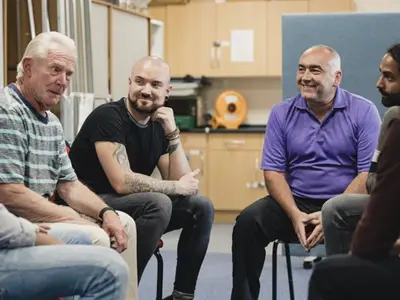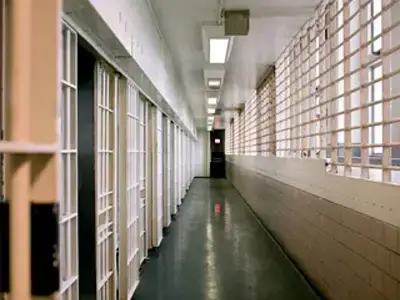Improving corrections and reentry systems for stakeholders and communities through data-driven approaches
The scope and reach of corrections in the United States is considerable, and many pressing challenges face local, state, and federal correctional systems, policymakers, and the people and communities directly impacted by these systems. The United States has the highest incarceration rate in the world; at the end of 2021, nearly 1.2 million adults were held in state or federal prisons and 640,000 individuals in jails. That same year, approximately 444,000 people were released from state and federal prisons in 2021 and many more were released from local jails.
The sheer number of people involved – the incarcerated population, those under community supervision, the correctional workforce, and family members of people in all of these groups – means that the correctional system touches American life at the individual, family, and societal levels. Given the many needs of reentering people and challenges facing them upon release, it is not surprising that nearly half of those released end up reincarcerated within five years. The effects of incarceration and reentry extend to the emotional and financial well-being of the partners, children, and parents of those who serve time.
Considering the complexity of correctional systems, the need for data-driven solutions has never been greater. Among these key needs are:
- Improvements in institutional policies and practices. Jails, state and federal prisons, and juvenile detention and residential centers need research-based solutions, including validated risk and needs assessment tools, policies and practices that limit the use of restrictive housing, and strategies for delivering effective programming.
- Effective reentry strategies. Reentry programs and services that are culturally competent, developmentally appropriate, and that provide continuous service delivery prior to and after release can help returning youth and adults prepare effectively, achieve educational goals, find meaningful employment, re-establish and maintain family relationships, and contribute to civic engagement in their communities upon release.
- Integration of supportive technology. With the right strategy, technology can support positive behavioral change and service receipt among justice-involved people.
- Data-driven decision making in community corrections. Dynamic tools based on continually evolving information and advanced statistical techniques can help local jurisdictions direct supervision and treatment resources where they are most needed and assist in workforce planning.
- Solutions to pressing correctional workforce issues. Effective policies and practices can help leaders in the corrections system address workforce recruitment and retention challenges, reduce structural stressors, and promote employee well-being and safety.
Our experts lead research, evaluation, and training and technical assistance (TTA) efforts to address these needs and other emerging issues in the corrections and reentry field. Projects are grounded in the perspectives of people with lived experience with corrections and reentry and we work collaboratively with community stakeholders most directly impacted by the research.
Project Highlight
Federal corrections research and evaluation in support of the First Step Act
RTI is engaged in four projects that support the First Step Act (FSA) of 2018, which was created to balance the size of the federal prison population with public safety. These projects include:
- Evaluations of seven BOP reentry programs under a contract with the National Institute of Justice. This study includes outcome, process, and cost evaluations of BOP programs that provide diverse approaches for faith-based programming, therapeutic communities, and cognitive behavioral, mental health, and sex offender treatment.
- A comprehensive assessment of BOP restrictive housing practices. This study includes a literature and policy review, administrative data collection and analysis, and facility interviews and site observations in up to 15 BOP prisons.
- A Department of Labor-funded evaluation of the Partners for Reentry Opportunities in Workforce Development (PROWD) initiative in collaboration with Mathematica, which uses FSA funds to support innovative, employment-focused reentry programs for people returning to their communities after an incarceration in federal prison.
- An annual review, validation, and release of the Department of Justice’s risk and needs assessment: the Prisoner Assessment Tool Targeting Estimated Risk and Needs (PATTERN).
Project Highlight
Integrated Dynamic Risk Assessment for Community Supervision
RTI and its partners are working with the Georgia Department of Community Supervision (DCS) to improve the understanding of the risk factors for recidivism while on community supervision. This project, led by RTI expert Dr. Chris Inkpen and funded by the National Institute of Justice, incorporates dynamic data collected by community supervision officers to build predictive algorithms that give them time-specific risk profiles for all the people on their caseload. These algorithms alert supervision officers as to when people require more services or attention and when they consistently present less risk to public safety in order to help officers prioritize their time. The algorithms produced for this study, which use advances in machine learning to increase predictive accuracy, are integrated statewide with DCS’s case management system to support its community supervision duties.
Project Highlight
The Multi-Site Family Study of Incarceration, Parenting, and Partnering
This groundbreaking 10-year mixed-methods RTI study of incarcerated fathers and their families followed nearly 2,000 incarcerated men and their intimate or coparenting partners in five states for 36 months. The study, funded by the Office of the Assistant Secretary for Planning and Evaluation, assessed the impact of family strengthening programming on holistic indicators of reentry success including parenting and coparenting outcomes, employment, and recidivism. It also used quantitative and qualitative interview data to document family support during incarceration and reunification during reentry. It produced one of the richest datasets on families and incarceration to date, along with collections of journal articles, book chapters, policy briefs, and practitioner guidelines for implementing family strengthening programs in correctional settings, culminating in the publication of Holding On: Fatherhood and Family during Incarceration and Reentry by the University of California Press.
Project Highlight
North Carolina Comprehensive Statewide Juvenile Reentry Systems Reform Implementation
As the evaluation partner on North Carolina’s deep-dive juvenile reentry system reform effort, RTI developed a detailed profile of the current reentry landscape and documented the development and implementation of planned reforms. The study team designed and administered a statewide survey of juvenile court counselors, conducted interviews and focus groups with facility staff, and reviewed reentry policies. The study team also leveraged North Carolina’s extensive administrative data to assess recidivism outcomes of reentry youth who experienced the pre-reform reentry system and developed a comprehensive portrait of recidivism from measures drawn from data across the juvenile justice, criminal justice, and corrections systems. RTI’s study informed reforms needed to improve outcomes among reentry youth, including the development of a pilot program to provide intensive, wraparound support to youth returning to their communities after confinement.
Related Projects
Building Evaluation Readiness in Correctional Education
Read More about Building Evaluation Readiness in Correctional Education






















